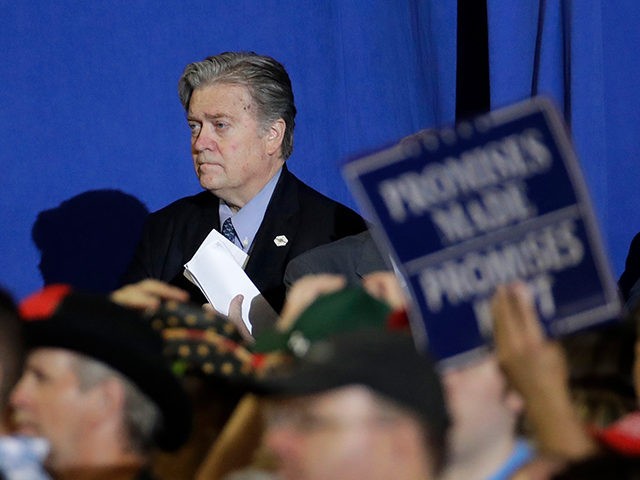President Trump’s former chief strategist and current Breitbart News Executive Chairman Stephen K. Bannon invited the editors of The Economist to his home for a candid discussion about the future of the populist economic nationalist movement and the civilizational challenges that will pit “the Judeo-Christian liberal West” against globalist “mercantilist” forces from China to Silicon Valley.
Bannon openly acknowledged his animus for the “Party of Davos” editorial positions of The Economist, referring to them as “the enemy” of economic nationalism for their “radical” obsession with free trade at all costs.
He also affirmed his loyalty to Trump and his desire to help him. Breitbart “will never turn on [Trump],” Bannon said, “But we are never going to let him take a decision that hurts him.”
Bannon acknowledged that in the White House he had “influence,” but outside at Breitbart he has “power.” He said he intends to use that power to “rally the base” and “have [Trump’s] back. The harder he pushes, the more we will be there for him.”
The discussion soon turned to what Bannon sees as the inevitable civilizational struggle between the Judeo-Christian classical liberalism of the West — which affirms human rights, freedom of speech, freedom of religion, and self-governance — versus the “mercantilist, Confucian system” of an ascendant China.
From The Economist:
Among the particular opponents he has in his sights, said Mr Bannon, seated in a dining-room decorated with Christian iconography and political mementos, are congressional Republicans (“Mitch McConnell, I’m going to light him up”), China (“Let’s go screw up One Belt One Road”) and “the elites in Silicon Valley and Wall Street—they’re a bunch of globalists who have forgotten their fellow Americans.” Despite his departure—voluntarily, he insists, though his resignation is reported to have been demanded of him—Mr Bannon says he will never attack his former boss. Yet Breitbart will caution Mr Trump to stick to the populist nationalist course Mr Bannon charted. “We will never turn on him. But we are never going to let him take a decision that hurts him.” The website offered an early taste of this in its disparaging coverage of Mr Trump’s “flip-flop” decision to send more American troops to Afghanistan, which was announced on August 21st and Mr Bannon strongly opposes (see article).
…
As Mr Trump’s campaign chief (his third in two months, the campaign having been roiled by scandals) Mr Bannon urged him to redouble that effort [to campaign on as a populist economic nationalist taking on the politically correct establishment]. “The American people understood his foibles and understood his character flaws and they didn’t care,” he says. “The country was thirsting for change and [Barack] Obama didn’t give them enough. I said, we are going for a nationalist message, we are going to go barbarian, and we will win.”
…
For Mr Bannon, who went from a working-class Virginian family to careers in Wall Street and Hollywood, those agreements epitomised the folly of globalisation, which he considers disastrous for American workers and avoidable. He hardened this critique after returning to America from a spell in Hong Kong; China, whose gaming of WTO rules Mr Bannon considers tantamount to an “economic war” against America, remains at the heart of it. A zealous Catholic who believes in the inevitability of civilisational conflict, he considers China’s growth to be an additional, overarching threat to America, which it must therefore dial back. “I want the world to look back in 100 years and say, their mercantilist, Confucian system lost. The Judeo-Christian liberal West won.”
…
The president has, if not fixed intellectual differences with Mr Bannon, different predilections, including his slavish regard for the military and business elites now stocking his cabinet, whom his former adviser derides. (“What did the elites do?” asks Mr Bannon. “These are the guys who gave us happy talk on Iraq, who let China into the WTO and said it would sign up to the rules-based order.”) When some of Mr Bannon’s early schemes failed—including the shabbily planned travel ban, now snarled up in the courts—Mr Trump turned increasingly to his more conventional advisers, including Mr Kushner and Mr McMaster. On trade and security in particular, they have edged him towards the mainstream. Whereas Mr Bannon urged the president to withdraw from NAFTA and Afghanistan, for example, he has launched a modest-looking review of the former and will send more troops to the latter. Increasingly isolated, Mr Bannon’s departure from the White House was predicted.
Read the rest here.

COMMENTS
Please let us know if you're having issues with commenting.